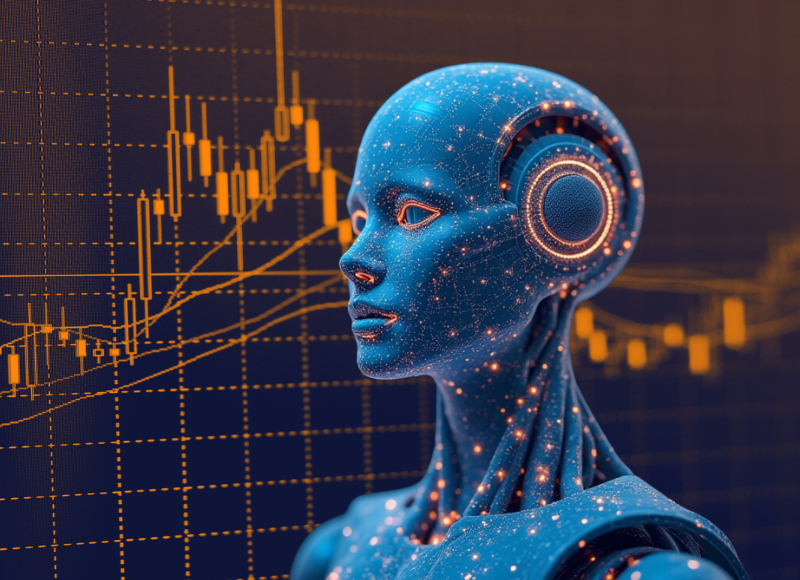The financial markets have always been at the forefront of innovation, continuously adapting to new technologies and methodologies to improve trading efficiency, decision-making, and profitability. In recent years, Artificial Intelligence (AI) has emerged as a powerful tool in the financial sector, leading to significant transformations. But is AI a boon or a bane for financial markets? This blog explores both sides of the argument, shedding light on the pros and cons of AI’s impact on finance.
What is Artificial Intelligence in Financial Markets?
Artificial Intelligence (AI) refers to the simulation of human intelligence processes by machines, particularly computer systems. In financial markets, AI includes a range of technologies such as machine learning (ML), natural language processing (NLP), and robotic process automation (RPA). These technologies are leveraged to analyze vast amounts of data, predict market trends, automate trading, and enhance decision-making.
AI tools in finance have gained popularity due to their ability to process and analyze data far more quickly and accurately than humans. From algorithmic trading to fraud detection and customer service chatbots, AI is revolutionizing the financial landscape.
Boon: The Benefits of AI in Financial Markets
1. Improved Data Analysis and Decision-Making
One of the primary benefits of AI in financial markets is its ability to analyze huge volumes of data and extract valuable insights. Traditional methods of analysis often rely on human intuition and experience, which can be limited by biases. AI, on the other hand, can process a far larger amount of data, identify patterns, and generate accurate predictions that would be difficult for humans to achieve.
For example, AI-driven systems can use historical data, market sentiment, and news sources to predict stock movements, offering traders and investors data-backed insights for better decision-making.
2. Algorithmic Trading and Automation
AI has revolutionized trading with algorithmic trading—the use of complex algorithms to automatically execute orders based on predefined conditions. AI algorithms can detect market opportunities and execute trades at lightning speed, something human traders cannot achieve. This leads to:
- Faster execution: AI can analyze and execute trades in milliseconds, ensuring that traders capitalize on market opportunities instantly.
- 24/7 market participation: Unlike human traders who need rest, AI systems can work continuously, ensuring that the market remains active at all hours.
This allows financial markets to become more efficient and liquid, enhancing overall market dynamics.
3. Fraud Detection and Risk Management
AI’s role in improving security and reducing fraud in financial markets cannot be overstated. Financial institutions use AI-powered tools to detect unusual activity and flag potentially fraudulent transactions in real time. By learning from vast amounts of data, AI can recognize patterns that indicate fraud or market manipulation, providing an additional layer of security to both financial institutions and customers.
Furthermore, AI-driven risk management tools help firms assess potential risks associated with investments, helping to minimize losses. These systems can analyze market conditions, geopolitical factors, and financial data to provide comprehensive risk assessments.
4. Personalized Financial Services
AI has enabled financial institutions to offer personalized services to customers. By analyzing customer data, AI tools can create tailored investment strategies, recommend financial products, and offer personalized advice based on individual risk tolerance and financial goals.
Robo-advisors, powered by AI, have become a popular alternative to traditional wealth management. These digital platforms use algorithms to offer personalized investment advice, making financial planning more accessible and cost-effective for individuals.
5. Cost Reduction and Efficiency
AI can streamline many processes in the financial industry, reducing overhead costs and improving operational efficiency. Tasks like document processing, compliance checks, and customer support can be automated, freeing up resources for more strategic endeavors. This automation leads to reduced human error and increased productivity, benefiting both financial firms and customers.
Bane: The Risks and Challenges of AI in Financial Markets
1. Job Displacement and Skill Gaps
One of the most significant concerns regarding AI in financial markets is the potential displacement of jobs. As AI tools automate tasks that were traditionally performed by humans, roles in areas like trading, analysis, and customer service may be at risk.
This shift could lead to significant job losses, especially for professionals who lack the technical skills required to work with AI systems. Additionally, there is a growing skills gap in the industry, as financial professionals need to acquire new skills to stay relevant in an AI-driven market.
2. Over-Reliance on Algorithms
While AI can certainly improve decision-making, an over-reliance on algorithms can create risks. AI systems are not infallible and can be influenced by biases in the data they are trained on. This could lead to incorrect predictions and decisions, especially in volatile market conditions where human judgment may be crucial.
Moreover, during extreme market events (e.g., a financial crisis), AI algorithms might behave unpredictably, causing further market disruptions. The 2010 Flash Crash, a sudden and severe market plunge, was partially attributed to algorithmic trading, highlighting the potential risks of automated systems.
3. Data Privacy and Security Concerns
AI in finance relies heavily on data, and the more data an AI system has access to, the better its predictions. However, this raises concerns about data privacy and security. Financial institutions handle sensitive customer data, and the use of AI increases the risk of cyberattacks and data breaches.
AI systems are also vulnerable to hacking or manipulation, where malicious actors could exploit AI algorithms to manipulate markets or steal confidential information. Thus, the widespread adoption of AI in finance necessitates strong cybersecurity measures and data protection protocols.
4. Market Volatility and Unintended Consequences
The use of AI in financial markets has the potential to increase market volatility. When multiple AI-driven systems are simultaneously trading, they may react to market events in similar ways, amplifying price movements and leading to sudden market swings.
For example, if an AI system detects a sell-off signal, it may prompt other AI systems to sell as well, exacerbating market declines. These collective actions could trigger a feedback loop, causing extreme price fluctuations and unintended consequences in the market.
5. Ethical and Regulatory Concerns
As AI systems continue to evolve, there are growing concerns about their ethical implications and the need for regulation. AI in financial markets can potentially manipulate market behavior, raise questions about transparency, and even violate financial regulations. Without clear guidelines and oversight, AI systems may act in ways that are not aligned with the best interests of the market or its participants.
Regulatory bodies are working to establish frameworks to ensure AI is used responsibly in finance, but the technology’s rapid advancement presents a challenge to existing laws and regulations.
Conclusion: A Boon or Bane?
AI’s presence in financial markets is undeniably transformative, offering significant benefits in terms of speed, accuracy, risk management, and efficiency. However, it also brings challenges, including the potential for job losses, over-reliance on algorithms, privacy concerns, and market instability.
The key to ensuring that AI is a boon rather than a bane for financial markets lies in responsible adoption. Financial institutions must balance AI’s capabilities with human oversight, ethical considerations, and robust regulatory frameworks. By doing so, AI can continue to enhance financial markets, fostering growth and innovation, while minimizing the associated risks.
As AI continues to evolve, its role in shaping the future of finance will undoubtedly become even more prominent. The question is no longer whether AI will be a boon or bane, but how well society adapts to its challenges and leverages its potential for long-term success.
Stay ahead of the curve and keep informed about the latest trends in AI and finance. Subscribe for more insights on how emerging technologies are reshaping industries around the world!



































